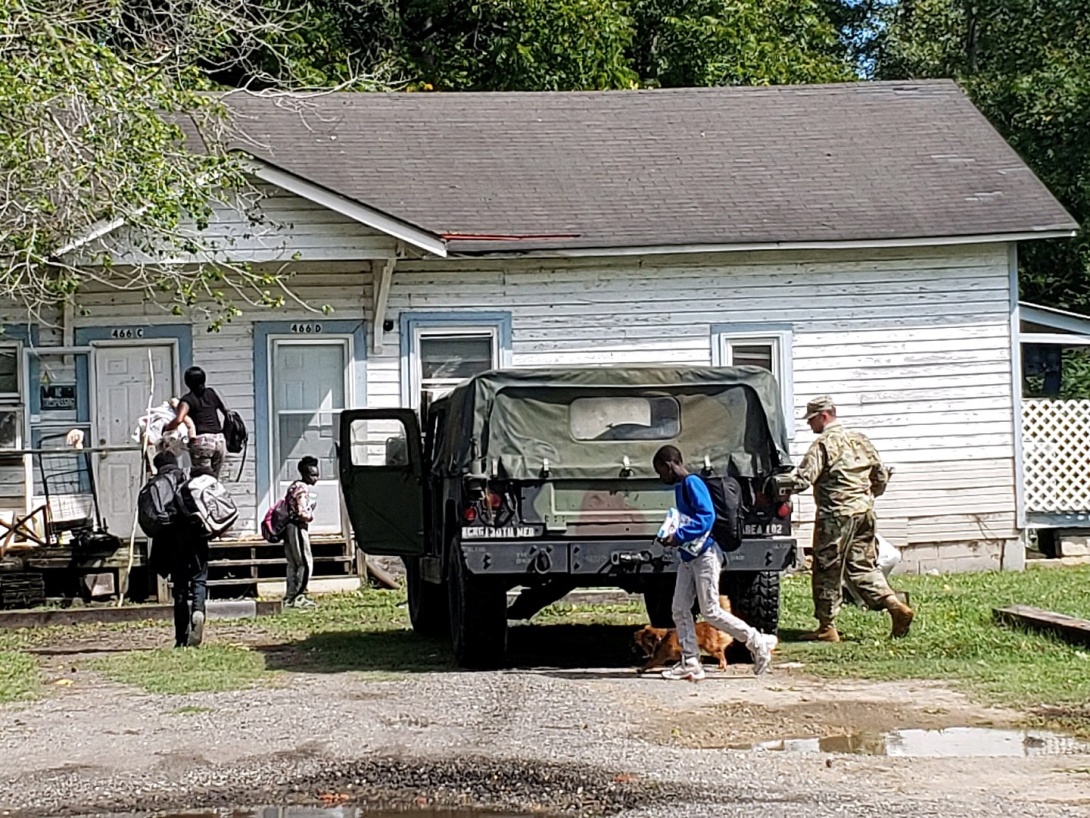INSTITUTE INDEX: How current climate policy deepens Southern inequality

A family returns to their home from a shelter in Whiteville, North Carolina, after Hurricane Dorian with help from soldiers with the N.C. National Guard. The Eastern North Carolina community has higher-than-state-average levels of poverty, which is exacerbated by the climate disruption-related disasters that plague the region. (N.C National Guard photo via Wikimedia Commons.)
Of the 10 U.S. states at greatest risk from hurricanes and other tropical storms, which are becoming more extreme due to human-caused climate disruption, number that are in the South: 10
Rank of the South among U.S. regions where power plants, many of them operated by state-regulated monopolies, emit the most climate-disrupting carbon as well as other health-damaging pollution: 1
Rank of the South among the poorest U.S. regions: 1
Current average annual economic cost of hurricane winds and storm-related flooding in the U.S.: $54 billion
Amount by which the median household income in North Carolina, among the states most vulnerable to hurricanes, lags behind that of the U.S. overall: $7,500
Percentage points by which the North Carolina poverty rate exceeds the U.S. rate: 1.3
Rank of storm-ravaged Eastern North Carolina among the state's regions with the highest poverty rate: 1
Eastern North Carolina's rank among the state's regions with the greatest concentration of African-American and Native American residents: 1
In the neighborhoods nationwide where FEMA has purchased the most properties as part of its post-disaster buyout program, percent of the population that's non-Hispanic white, according to a 2019 NPR investigation: 85
Percentage points by which that exceeds the non-Hispanic white population of the U.S. as a whole: 23
According to one study, average gain in net worth among white Americans living in counties that experienced at least $10 billion in storm damage between 1999 and 2013: $126,000
Over that same period, average loss in net worth for their African-American counterparts: $27,000
In a survey of Texas Gulf Coast residents displaced by 2017's Hurricane Harvey or whose homes experienced major damage in the storm, percent of white residents who said their lives were still somewhat or very disrupted a year after the disaster: 26
Percent of black residents who said the same: 41
Date on which millions of people worldwide and in communities across the South are planning to walk out of work and school to demand an end to fossil fuel use in what's being billed as a "global climate strike," which in the U.S. is being organized by many of the same black and brown youth pressing for the Green New Deal to tackle both global warming and inequality: 9/20/2019
Days after the climate strike that the most high-profile United Nations summit on climate change since the 2015 Paris gathering is set to open in New York City: 1
Year in which President Trump has said he plans to pull the U.S. out of the groundbreaking global climate agreement that emerged from the 2015 Paris conference: 2020
Number of states that are part of the U.S. Climate Alliance, a bipartisan coalition committed to upholding the Paris agreement regardless of what the White House does: 24
Number of those states that are in the South: 2*
Year by which the U.N.'s Intergovernmental Panel on Climate Change says carbon emissions must be cut in half to stave off a climate crisis that could threaten human society: 2030
* North Carolina and Virginia.
(Click on figure to go to source.)
Tags
Sue Sturgis
Sue is the former editorial director of Facing South and the Institute for Southern Studies.
